The U.S. State Department’s top African diplomat said Thursday that forces loyal to defeated Ivory Coast president Laurent Gbagbo are beginning to crumble. Assistant Secretary of State for African Affairs Johnnie Carson is urging both sides in the Ivory Coast conflict to show restraint and avoid urban fighting in the capital, Abidjan.
Assistant Secretary of State Carson says he cannot confirm reports from Ivory Coast suggesting that the collapse of forces loyal to Laurent Gbabgo may be imminent.
But he says forces supporting the internationally-recognized Ivory Coast election winner, Alassane Ouattara are making sizeable territorial gains and that Gbagbo should seize any remaining opportunity to step down peacefully.
Carson briefed reporters here following the unanimous approval by the U.N. Security Council late Wednesday of a resolution demanding that Gbagbo yield power immediately and all state institutions accept Ouattara as president.
The senior U.S. diplomat said the deterioration of Gbagbo’s position is underscored by the decision of his military chief to seek refuge at the South African embassy in Abidjan, and reports that the head of the para-military gendarmerie has taken similar action.
"There is a clear indication that the military forces of Gbagbo have in fact started to disintegrate," he said. "The rapid pace at which Alassane Ouattara’s forces have been able to move across the country from east to west and up to Abidjan suggests that there have been widespread desertions in the Gbagbo forces. The departure of his army commander lends greater credence to that."
The assistant secretary said the only places where there is significant opposition to pro-Ouattara forces are in and around Abidjan, and he appealed to the sides to show restraint and to make avoiding civilian casualties a top priority.
Carson said he is especially concerned about an undisciplined pro-Gbagbo youth militia which has been manning barricades in and around the capital and been accused of widespread killings. He said if the feared urban warfare occurs it will be the responsibility of Gbagbo and his inner circle, and that they will have to answer for their actions to the world community.
"If in fact there is major violence in Abidjan, and Gbagbo does not step aside, he and those around him including his wife Simone Gbagbo will have to be held accountable for the action that they failed to take to stop it," said Carson.
The crisis in Ivory Coast began after the November presidential election, which both the country’s electoral commission and international observers said was won by Ouattara.
But Gbagbo, the country’s leader since 2000, claimed victory and refused to hand over power. Human rights groups say the ensuing violence has claimed more than 400 lives and displaced as many as one million people.
Carson said he is worried about the prospect of a full-scale civil war in Ivory Coast that would prompt a refugee exodus and undermine the hard-won recent stability in Liberia and Sierra Leone.
US: Gbagbo Forces in Ivory Coast Begin to Crumble




